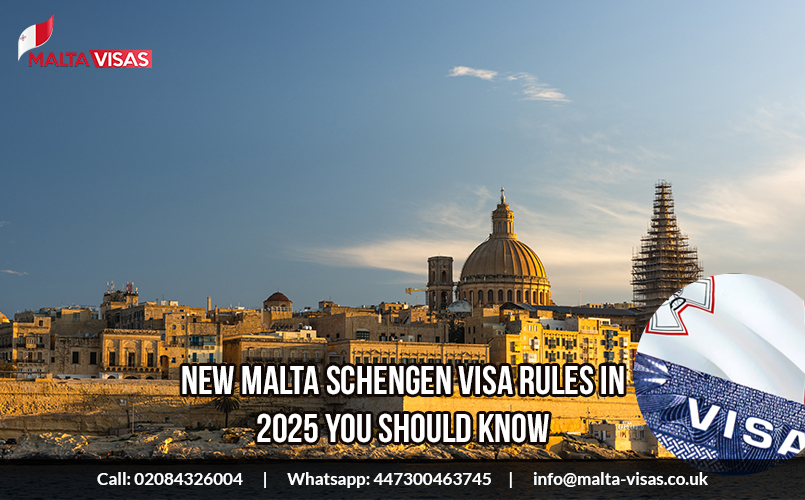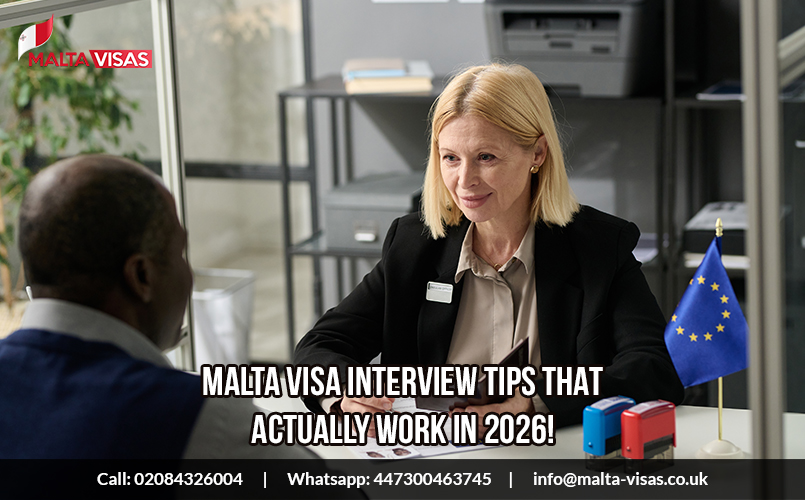
New Malta Schengen Visa Rules in 2025 You Should Know
As we step into the middle of 2025, the Malta Schengen Visa Rules have evolved quite a bit. Many significant changes have been introduced for travellers from the United Kingdom. Whether anyone is looking for leisure, business, or academic opportunities, the applicants from the UK will have to make themselves aware of the detailed document requirements, the processing norms, and border control updates. Thus, we have formulated this guide, which gives you all the possible insights, essential stats, and practical tips specially tailored for British citizens, which can make the journey to Malta very smooth and secure.
Moreover, if you need an appointment slot for a Schengen visa for Malta, UK, apply immediately at MALTA VISAS UK. You will learn more about this as you read this blog.
Who Needs a Malta Schengen Visa from the UK?
As per the recent Malta Schengen Visa Rules, citizens of the UK who are British Passport holders can travel to Malta absolutely visa-free. They can even travel to any country in the Schengen area for up to three months within a 6-month period. The reason could be anything from tourism, visiting family, business meetings, cultural events, and many more.
Now, legal residents who are staying in the UK from different countries with a UK eVisa/share code will definitely have to apply for a Schengen visa to travel to Malta if their country doesn’t allow them to travel to Schengen countries visa-free.
Malta Schengen Visa Requirements for UK Residents
As far as UK travellers are concerned the requirements for Malta Schengen Visa differ greatly. Moreover, few of the main pointers to keep in mind are:
- Your passport should be issued from the last ten years and should remain valid for three months after you return back to the UK.
- You will need to show that you have sufficient funds to sustain yourself during the stay. Hence you need to have bank details to prove it. Additionally, reserved return airfare tickets and confirmed accommodation slips are also needed.
- All applicants who are applying for a short-stay Schengen Visa from Malta will have filled out and completed the application. Moreover, they will need to get travel insurance that should cover €30,000 minimum in all Schengen areas, recent colored photographs, and relevant supporting documents for the type of visa they are applying for.
- Furthermore, you will have to bring the employment payslips and leave letters, college enrollment certificate and other financial details.
Applying for a Malta Schengen Visa Online from London
You can easily apply for an Online Malta Visa From London or other visa centres at MALTA VISAS UK. Follow these simplified guidelines:
- Click on Apply online and fill up the form.
- An executive will contact you immediately for clarification. After that, he will proceed to book you an appointment slot as per your convenient date and time.
- Arrange all the relevant supporting documents. Take the original and copy both. Be present at the visa centre on time. Finish submitting your biometrics and attend the interview in case the visa official asks you.
- Get the tracking number and wait for the visa to get processed. You can opt for collecting the visa from the visa centre or get it delivered to your residence via courier.
Understanding the New Border Controls in 2025
There is a very important update for the travelers from the UK under the Mata Schengen Visa Rule. It is the EU’s Entry/Exit System(EES), set to launch at 12 October 2025:
- All the entry points including the Dover, Folkestone, or St Pancras International, expect a fingerprint and photo capture on mandatory basis. This will lead to longer border wait times and additional document checks.
- All travelers will have to answer the Schengen Border Code questions. In case there is a missing passport stamp it should be rectified with supporting evidence like travel tickets.
- Don’t even think about overstaying. As it will lead to bans for up to 3 years from all Schengen Nations.
Malta Schengen Visa Processing Times: Insights and Tips
As per Malta Schengen Visa Rules, the standard processing time is around 14 to 15 working days. Usually, UK citizens benefit from a quicker service compared to legal residents of the UK from other countries.
- You can apply 6 months in advance but not less than 15 days before your confirmed travel date. During peak times such as summer and Christmas holidays, we recommend that you apply at time 4 to 6 weeks in advance.
- Generally, there is no availability of fast-track service. But in case of severe emergencies like business deals, medical, or humanitarian reasons, the visa official might consider giving expedited decisions.
- Compared to high-risk or high-volume countries, the applicants of UK generally experience fewer delays.
What are some Unusual Tips for Schengen Malta Visa from UK Applicants?
In order to increase the approval chances under Malta Schengen Visa Rules:
- Get all the documents certified. If the documents are in other languages than English or Maltese, then get them translated.
- Always try to maintain a clean travel history. In case there is any history of previous refusals in any other Schengen countries, then this can reduce the current application for Malta.
- Organise the documents in a proper manner. The officials at the border or Malta visa centre always encourage visitors to keep the documents in an orderly fashion, and easy to review application packets.
- If there is a passport stamp missing, always carry the other proof of entry, such as boarding passes, e-tickets, etc, in order to avoid overstay complications.
Statistical Trends and Visa Outcomes for UK Applicants
- Last year, in 2024, Malta processed around 45,600 Schengen visa applications. The result was a 38.5% rejection rate. Therefore, Malta is considered as the most stringent nation in the Schengen area.
- It is reported that the applicants from the UK go through faster processing, but a tough screening process. This is even more strict for long-stay and family reunification visas.
- For British citizens, the visa free movement remains available for short visits. But please remember that any kind of entry that exceeds 3 months will surely be flagged for compliance checks.
Goods, Money, and Medical Rules for UK Travelers to Malta
- There are even strict rules to bring food, cash, and valuables into the territory of Malta. So declare if you are carrying more than €10,000 in currency or cheques to avoid any kind of confiscation.
- Do not carry any meat or dairy products. They are absolutely prohibited.
- Furthermore, Malta also requires you to carry any kind of yellow fever vaccination certificate. This is mandatory only for travelers who are coming from the listed transmission risk countries.
Common Mistakes to Avoid while going to Malta from UK!
Beware of these errors as per the Malta Schengen Visa Rules in 2025:
- If you don’t mention the return dates or provide detailed itineraries.
- If you don’t have a proper travel insurance certificate with Malta named as the first point of entry.
- Carrying Non-certified and non-translatable documents.
Malta Schengen Visa Rules: What the Future Holds?
As we have seen, EES is going to be launched with the induction of enhanced digitization and consistent high rejection; therefore, it is of utmost importance that Malta’s Schengen Visa Rules be implemented with diligence and preparation. Hence, we advise that all travellers from the UK apply for a visa with ample amount of time in hand. Moreover, the supporting documents should be accurate and in line with the new entry rules. Furthermore, by following the tips here and keeping a sound strategy, the odds of approval will surely improve for Malta Schengen visas in 2025.

FAQs
1.How many entries are available for the Malta Schengen Visa?
There are mostly three types. Single, double and multiple entries which you can apply with your Malta Schengen Visa UK. However, remember that approval only depends on the itinerary and travel history which is strongly supported by the documents.
2.Which relevant documents need to be translated?
Any kind of non-English documents have to be translated into English or Maltese language through proper certification.
3.What is the SIS check?
SIS is known as the Schengen Information System. The process is used to vet applicants with criminal records or previous visa violations for further review or rejection.
4.What do business visa applicants for Malta need to watch out for?
The business travelers will have to show proof of meetings or ventures. They will have to provide the details of the Malta-based company and other relevant documents that prove that the trip is purely business-related.



